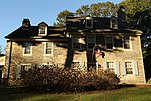|
Westminster Theological Seminary
Westminster Theological Seminary (WTS) is a Protestant theological seminary in the Reformed theological tradition in Glenside, Pennsylvania. It was founded by members of the faculty of Princeton Theological Seminary in 1929 after Princeton chose to take a liberal direction during the Fundamentalist–Modernist controversy. History Westminster Theological Seminary was formed in 1929, largely under the leadership and funding of J. Gresham Machen.[2] Though independent, it has a close relationship with the Orthodox Presbyterian Church, which Machen helped found in 1936. The seminary was founded by members of the faculty of Princeton Theological Seminary, following a controversy over the liberal direction that Princeton was beginning to take.[3] Westminster Theological Seminary considers itself to be the faithful continuation of Princeton's historic theological tradition. Many of the founders of Westminster, including Machen, John Murray, Oswald Allis, Robert Dick Wilson, and Cornelius Van Til, had been professors at Princeton prior to the controversy.[3] The first president of the seminary was Edmund Clowney, who served from 1966 until 1984. He was followed by George C. Fuller and Samuel T. Logan. The current president is Peter Lillback, who also serves as a professor of historical theology.[4]  In 1982, the California branch of Westminster became an independent institution, the Westminster Seminary California, and in 2009 the Dallas branch was established as Redeemer Theological Seminary and since 2017 has been Reformed Theological Seminary's Dallas campus. In 2011, Westminster signed a Memorandum of Understanding with International Reformed Evangelical Seminary in Jakarta, Indonesia. The two schools have been publishing the journals: International Journal of Reformed Theology and Life and Unio Cum Christo.[5] Westminster also created an endowment for the Stephen Tong Chair of Reformed Theology the same year.[6] Theological positionIn Philadelphia on September 25, 1929, J. Gresham Machen declared the following in his inaugural address:
 The current board and faculty continue to hold to this original vision. All trustees and faculty members are required to affirm their agreement with the theological perspective presented in the Westminster Confession of Faith and the Larger and Shorter Catechisms, the core doctrinal statements of many Presbyterian denominations.[8] Westminster's strict adherence to the Westminster Standards and to Protestant theology in general has led to several dismissals of tenured faculty members since 1980. In 1981, theology professor Norman Shepherd was dismissed from Westminster due to his views on the doctrine of justification by faith alone.[9] In 2008, Old Testament professor Peter Enns was dismissed from Westminster over controversial views expressed in his book Inspiration and Incarnation: Evangelicals and the Problem of the Old Testament,[10][11] and in 2014 Old Testament professor Douglas Green was terminated from his position over his views on the relationship between the Old Testament and the New Testament.[12] In the early 1990s, Middle States Association of Colleges and Schools disputed with Westminster because of its refusal to give women membership on the board of trustees.[13] The accrediting body backed down after the United States Department of Education took the seminary's side in the dispute.[14] AccreditationWestminster, under a charter from the Commonwealth of Pennsylvania granted in 1930 and as subsequently amended, has the power to grant the degrees of Master of Arts in Counseling, Master of Arts (Religion), Master of Divinity, Master of Theology, Doctor of Ministry, and Doctor of Philosophy.[15] Since 1954, Westminster is accredited by the Middle States Commission on Higher Education.[16][17] It is also accredited by the Association of Theological Schools in the United States and Canada.[18] AcademicsThe seminary currently offers the following degrees:[18][19]
Westminster publishes the semi-annual Westminster Theological Journal.[20][21] LegacyAccording to Roger E. Olson, Westminster has had an influence on evangelicalism far beyond its size.[22] Beyond Westminster's impact in the theological realm, the pioneering work of J. Alan Groves and his students has produced the codification of the Westminster Leningrad Codex, which underlies all modern Bible software.[23] PeopleLeadership
Notable faculty (past and present)
Notable alumni
See also
References
External linksWikimedia Commons has media related to Westminster Theological Seminary. |
||||||||||||||||||||||




